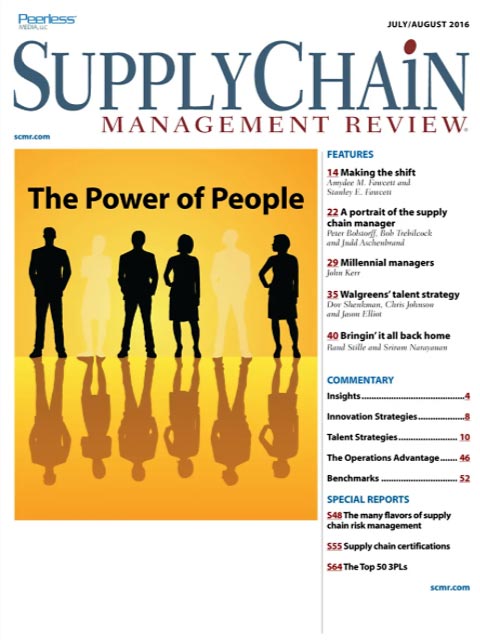Sorry, but your login has failed. Please recheck your login information and resubmit. If your subscription has expired, renew here.
July-August 2016
What’s the difference between us and our competitors? Our people!” I can’t think of an organization that doesn’t publicly state that its people are its most important asset. Yet, anyone who has been in the workforce for any length of time knows that when the rubber hits the road—or something else hits the fan—people are usually the first casualty of cost cutting. It’s far easier to free up your talent for “other opportunities” than it is to close a plant or sell a fleet of trucks. Browse this issue archive.Need Help? Contact customer service 847-559-7581 More options
Manufacturers are frequently called upon to build supply chains that support a single project. These one-off ventures can be subject to volatile demand, and sited in remote locations where the climate is extreme. Take, for example, a project that involved the transportation of 20 truckloads of chemicals per day within a tight delivery window to a site in the middle of a desert.
The highly uncertain nature of these temporary supply chains requires managers to be extremely inventive as they strive to meet cus¬tomers’ changing expectations.
If every project is unique, how can a chemical manufacturer develop a common methodology for building and managing supporting sup¬ply chains that minimizes cost and maximizes efficiency? Researchers at the MIT Center for Transportation & Logistics took on this challenge. Sponsored by a multi-national chemical company, the project called for the development of a repeatable template that could be applied to project-driven supply chains. The lessons learned can be applied outside of the chemical industry.
 |
This complete article is available to subscribers
only. Click on Log In Now at the top of this article for full access. Or, Start your PLUS+ subscription for instant access. |
SC
MR
Sorry, but your login has failed. Please recheck your login information and resubmit. If your subscription has expired, renew here.
July-August 2016
What’s the difference between us and our competitors? Our people!” I can’t think of an organization that doesn’t publicly state that its people are its most important asset. Yet, anyone who has been in the… Browse this issue archive. Access your online digital edition. Download a PDF file of the July-August 2016 issue. |
Download Article PDF |
Manufacturers are frequently called upon to build supply chains that support a single project. These one-off ventures can be subject to volatile demand, and sited in remote locations where the climate is extreme. Take, for example, a project that involved the transportation of 20 truckloads of chemicals per day within a tight delivery window to a site in the middle of a desert.
The highly uncertain nature of these temporary supply chains requires managers to be extremely inventive as they strive to meet cus¬tomers' changing expectations.
If every project is unique, how can a chemical manufacturer develop a common methodology for building and managing supporting sup¬ply chains that minimizes cost and maximizes efficiency? Researchers at the MIT Center for Transportation & Logistics took on this challenge. Sponsored by a multi-national chemical company, the project called for the development of a repeatable template that could be applied to project-driven supply chains. The lessons learned can be applied outside of the chemical industry.
 |
SUBSCRIBERS: Click here to download PDF of the full article. |
SC
MR

Latest Supply Chain News
- Technology’s role in mending supply chain fragility after recent disruptions
- Tech investments bring revenue increases, survey finds
- Survey reveals strategies for addressing supply chain, logistics labor shortages
- Israel, Ukraine aid package to increase pressure on aerospace and defense supply chains
- How CPG brands can deliver on supplier diversity promises
- More News
Latest Podcast

 Explore
Explore
Topics
Latest Supply Chain News
- Technology’s role in mending supply chain fragility after recent disruptions
- Tech investments bring revenue increases, survey finds
- Survey reveals strategies for addressing supply chain, logistics labor shortages
- Israel, Ukraine aid package to increase pressure on aerospace and defense supply chains
- How CPG brands can deliver on supplier diversity promises
- How S&OP provides the answer to in-demand products
- More latest news
Latest Resources

Subscribe

Supply Chain Management Review delivers the best industry content.

Editors’ Picks





